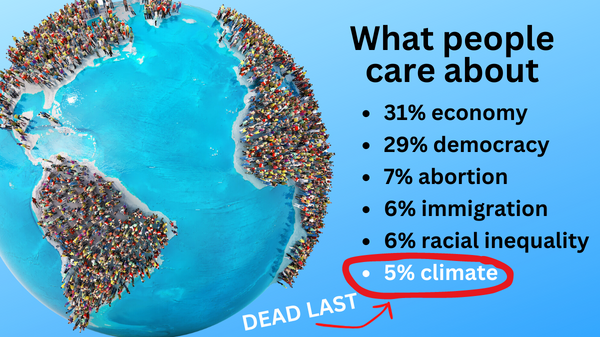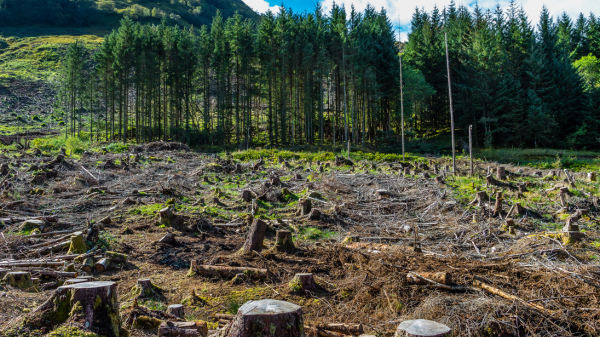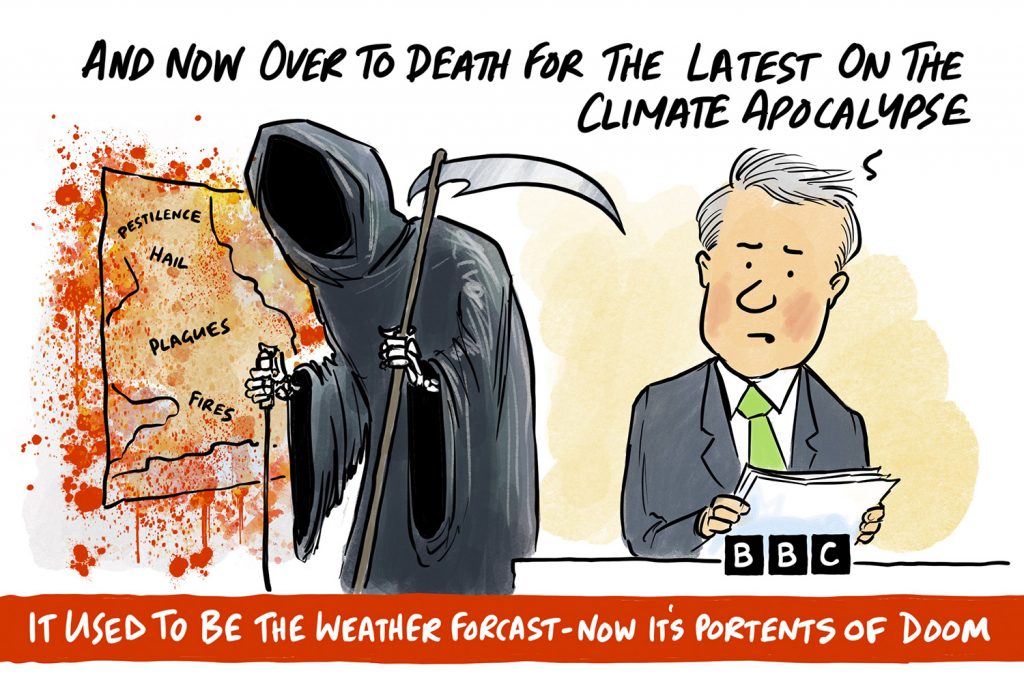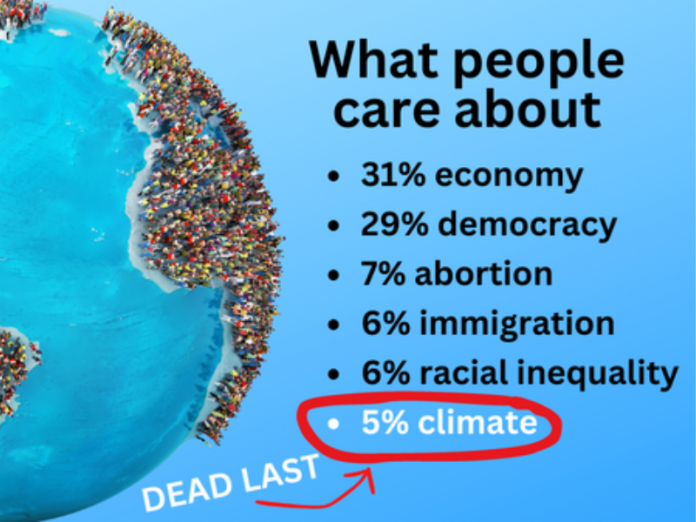YOU SHOULD SUBSCRIBE TO CLIMATE CHANGE WEEKLY.
IN THIS ISSUE:
- Backlash, Polls Confirm Climate Change Is Low-Priority Issue
- Podcast of the Week: Hottest Day in 120,000 Years? That’s a Joke, Right?
- Electric Cars ‘Unsafe at Any or No Speed,’ Cost More to Repair
- Scotland Cut Down Millions of Trees for Wind Farms
- Video of the Week: Heat Waves, Fires, and Climate, Oh My!
- Climate Comedy
- Recommended Sites
Miss Anything at Heartland’s Climate Conference? No Problem.
Backlash, Polls Confirm Climate Change Is Low-Priority Issue

Opinion polls and the actions of countries around the globe prove once again climate change ranks behind most other issues in the public’s mind and certainly behind the economy.
A story in the Washington Post (WaPo) notes that even amid the media’s blitzkrieg of climate alarm surrounding the present heatwave, most people are not clamoring for radical climate action:
If proponents of climate policies thought this year’s scorching summer temperatures and extreme weather events would propel the world to embrace rapid action to lower greenhouse gas emissions, they were sorely mistaken. If there is to be any hope that governments might address this issue, they will need a new strategy.
Around the world, nations are choosing to prioritize economic growth and national interest over climate policy.
Which countries seem to be prioritizing their national interests and people’s well-being over climate change, according to WaPo? China, India, Indonesia, and various countries in the European Union, to name a few. Although China, India, and other developing countries clamoring for economic growth have long talked the talk about climate policies, they have never walked the walk. Instead, they consistently increase their fossil fuel use even in the face of heat waves, hurricanes, and droughts. They recognize that such weather events are natural and the best defense is wealth.
The surprise for some is Europe, long the leader in clamoring for climate action. Climate-driven energy and farm policies are bringing protests, and climate protesters are facing sometimes-violent backlash. Right-of-center governments are coming to power there, and new parties are forming to represent the interests of people dependent on fossil fuels—and they are winning government seats. Governments are listening and watering down or backing off their climate commitments or timetables and boosting fossil fuel use and production. From Germany to Ireland to Italy, France, the Netherlands, Norway, Spain, and the United Kingdom, climate action is taking a back seat to other priorities.
In some countries, new governments less committed to radical climate action are taking power. In other countries, governments fearing economic decline and a loss of political power are responding to heat waves and other weather events not with a greater commitment to fighting climate change but with proposals to water down existing climate commitments. Heat or no heat, governments are cooling on climate action.
Polls show most of the public supports a focus on matters other than the “existential threat” climate change supposedly poses.
In the United Kingdom, for example, Yougov.com, a Britain-based international internet market research and data analytics company, conducted a brief, one-question survey on behalf of CAR 26, a UK-based organization that campaigns for informed and rational analysis of climate matters, and my own Heartland Institute.
In 2021, CAR sponsored a survey which asked, “To what extent would you support or oppose having ‘eco-lockdowns’ (lockdowns for environmental reasons) in the future for the UK to meet its Net Zero Carbon targets?” At the time, 39 percent of those who had an opinion on the matter strongly supported COVID-19-style lockdowns to fight climate change, with government forcibly keeping people home and cutting their energy use.
Despite two additional years of accelerated fearmongering by climate-profiteering elites and their lapdogs in the mainstream media, the number of those surveyed who strongly support eco-lockdowns has fallen by 20 percent in a new survey in 2023, with the decline in support most significant among those who identify themselves as politically liberal. The survey also showed strong opposition to government lockdowns to meet net-zero targets has increased from 62 percent to 64 percent.
Should that surprise anyone? I think not, based on a recent survey conducted in the United States.
The Quinnipiac University Polling Institute asked Americans whether they were concerned about climate change, among other questions. Forty-two percent of those polled said they were very concerned, and 25 percent were somewhat concerned. The remaining third of those surveyed were either not so concerned (12 percent) or not concerned at all (20 percent). The poll surveyed 2,056 adults 18 years and older, with 1,809 describing themselves as registered voters.
The media hype has worked in the United States. Despite copious amounts of data showing extreme weather events such as droughts, floods, and hurricanes have not increased in number or severity in recent decades, 60 percent of those surveyed “think that the extreme weather events in the United States over the past few years are related to climate change.”
Even so, most those surveyed did not believe climate change would affect them or anyone in their families.
Do these questions tell us much? Not really. The average voter or survey respondent can be, and likely is, concerned or very concerned about a variety of issues. There are things that affect them every day, such as crime, taxes, and jobs, and more esoteric or tangential concerns such as the state of democracy, educational achievement, gender equity, and, yes, climate change. Where the rubber meets the road is where any particular social or political concern ranks in comparison with other issues. On that question, climate change ranks dead last.
Quinnipiac states,
When registered voters were given a list of eight issues and asked which is the most important to them in deciding who to vote for in the election for president, 31 percent of voters say the economy and 29 percent say preserving democracy in the United States. Seven percent say abortion, 7 percent say gun violence, 6 percent say immigration, 6 percent say health care, 6 percent say racial inequality, and 5 percent say climate change.
There you have it. What some people call the defining issue and greatest challenge facing humanity in our time, climate change, ranks dead last. I’ve never heard anyone refer to immigration or economic decline as an existential threat, yet they both rank higher than climate change as what survey respondents feel is most important, with the economy being the top concern for more than six times as many people as consider climate change the biggest issue.
Quinnipiac’s survey is not an outlier. Poll after poll shows climate change ranks last or near last among the issues that most concern voters or poll respondents. I’ve covered this multiple times at Climate Change Weekly—here and here, for example.
Not only does climate change rank low in every survey’s list of concerns, poll after poll also shows the public isn’t willing to substantially change how they live or pay very much to fight climate change, regardless of how worried they say they are about it or how immediate and impactful they think it may be.
Polling data, the very public backlash against increasingly disruptive climate protests, and the public anger about high energy prices, government limits on travel and lifestyle choices, and failing energy infrastructure, as displayed during recent local and general elections across Europe, may account for why European politicians are backtracking on their carbon dioxide cutting goals and timetables.
Let’s hope U.S. politicians get the hint before we follow Europe—or California—too far down the road to economic perdition.
Source: The Washington Post, Quinnipiac, CAR 26
Get your Copy at Amazon TODAY!

Podcast of the Week
Is a day this July the hottest day in 120,000 years? Of course not. Heartland Institute Senior Fellow Anthony Watts was a guest this week on KTRH Radio, Houston’s Morning News with Sharon and Jim to debunk that ridiculous claim. Anthony also talks about how and why alarmists have changed the term “global warming” to “climate change,” which means you can blame every bit of extreme weather on human activity. That’s also a claim not backed up by science.
Subscribe to the Environment & Climate News podcast on Apple Podcasts, iHeart, Spotify or wherever you get your podcasts. And be sure to leave a positive review!
Electric Cars ‘Unsafe at Any or No Speed,’ Cost More to Repair

Insurers and the U.K. government are warning auto repair shops, scrap yards, and towing services to isolate or quarantine electric vehicles that have been in accidents, because they might spontaneously combust.
Government guidelines recommend electric vehicles with damaged batteries be “quarantined”—stored at least 15 meters away from other vehicles—because of the risk of battery fires.
The Telegraph reports, “Damaged batteries pose a risk of ‘thermal runaway’ where the energy stored in the battery releases rapidly, creating temperatures of up to 400C.”
Damaged vehicles’ combustibility could lead to higher insurance premiums: the insurance industry expects the additional costs to store damaged electric vehicles in special facilities could top 900 million pounds annually. Under Transportation Department guidelines, as many as 100 gasoline or diesel-fueled cars can be stored in the amount of space that just two damaged electric vehicles should occupy.
There is even worse news from insurers.
“Claims for damaged electric cars cost insurers 25 [percent] more than their petrol counterparts, the report found,” The Telegraph reports. “Electric vehicles also take 14 [percent] longer to repair.
“Rapidly depreciating values mean the cost of replacing a battery outweighs the cost of the car after just one year, leaving insurers no choice but to scrap the car, … a report by automotive risk firm Thatcham Research said,” The Telegraph reports.
Sources: Climate-Science Press; The Telegraph (behind paywall)
Heartland’s Must-read Climate Sites
Scotland Cut Down Millions of Trees for Wind Farms

Through most stages of their lives, trees are carbon sinks, and planting trees is commonly touted as part of the solution to preventing supposedly catastrophic climate change. In Scotland, however, trees are being cut down to make room for intermittently operating wind turbines, pitting one “climate solution” against another.
To clear the ground for wind turbines, an estimated 15.7 million trees have been removed since 2000 on land controlled by Forestry and Land Scotland (FLS), according to Scottish Governments Rural Affairs Secretary Mairi Gougeon, The Telegraph reports. That is an average of more than 1,700 trees destroyed each day.
In a letter to members of the Scottish Parliament, Gougeon said wind farm operators are expected to undertake “compensatory planting elsewhere,” but she provided neither guarantees that replanting has taken or will take place, and she cited no data indicating it had been done or where and in what amount any replanting had occurred.
Theoretically, Scotland already hosts enough wind turbines to satisfy more than half the entire United Kingdom’s total current electric power demand, yet the ruling Scottish National Party wants to add more than double the present amount of wind power, under new rules that relax environmental restrictions and expedite permitting under looser planning conditions.
“The John Muir Trust, a conservation charity, has warned the new threshold for allowing wind farm companies to build turbines on wild land is so low that it appears impossible for them not to meet it,” said The Telegraph.
Liam Kerr, a Tory member of the Scottish Parliament, told The Telegraph he was surprised by Gougeon’s letter.
“Most people will be astonished to see the number of trees cut down to make way for wind farms,” said Kerr. “I’ve been contacted many times by rural communities all over the country questioning the location of these developments, sharing legitimate concerns not just about the visual impact but also damage to wildlife and business.
“Now we learn there’s significant damage when it comes to trees,” Kerr said.
Parliament and the ruling government should be more aware of and transparent about the “significant costs” incurred by the push for larger and greater numbers of industrial wind facilities, Kerr told the Telegraph.
Source: The Telegraph
Video of the Week
If you turn the news, you’d probably think parts of the Earth are literally on fire. The corporate media continues pushing the narrative that temperatures are the highest ever, but it’s simply not true.
For this episode of Climate Change Roundtable, Steve Milloy, founder of JunkScience.com, joins the show to lend his talents shredding the alarmist media narrative. Steve joins host Anthony Watts and panelists Linnea Lueken and H. Sterling Burnett to highlight the media’s false predictions over the years, reveal data that destroys today’s narrative, and discuss particulate matter in the air. Environmentalists say that there is a serious threat to human health from particulate matter in the air — usually PM 2.5 — but is it really as big an issue as they claim?
Watch every episode of The Heartland Institute’s Climate Change Roundtable show LIVE every Friday at 1 p.m. CT.
Climate Comedy
 via Cartoons by Josh
via Cartoons by Josh





























